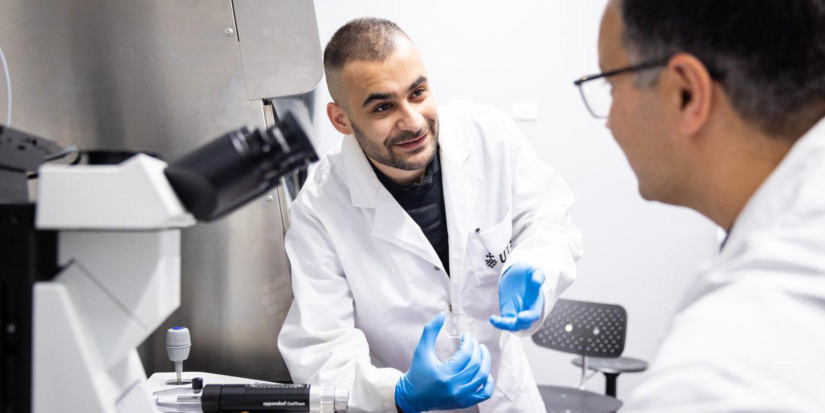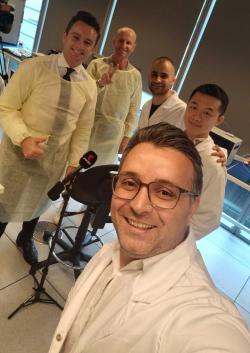Payar Radfar believes the trick to building a new business is to expose yourself to as many new ideas as possible. For him, that was during his graduate research program (a.k.a. his PhD).

Before his PhD in biotechnology was even finalised Payar Radfar was making waves in the medical world with a cancer diagnostics tool.
He also had an established startup that reduces a major bottleneck in production for lab-grown meat producers.
The two innovations seem like an unlikely pair but, as he says, “that’s what’s possible with a PhD”.
An engineer enters biotech
As a mechanical engineer specialising in fluid mechanics at a wind turbine startup, pursuing a PhD in biotechnology wasn’t an obvious choice. The leap into the biomedical space meant a very steep learning curve into human biology.
“The world of biotechnology is much bigger than it looks from the outside,” he says.
But that didn’t deter Payar.
Our career is going to be decades and decades long. We might as well make it exciting.
- Payar Radfar
He had the idea of creating a device that helped to diagnose and monitor cancer in blood cells – a far cry from the invasive biopsies currently conducted on cancer patients.
He was exploring different directions to take his idea when he heard about his future research supervisor: Professor Majid E. Warkiani.
“I knew that UTS does a lot of work in cancer diagnostics. I approached Majid and had a chat. We continued to talk, and my PhD journey started from there,” Payar says.
From day one in his PhD program, Payar set out with his research group to develop his device. After publishing the results, his research caught the attention of mainstream media, and numerous institutes and researchers.
“Clinicians are really interested in testing the device with patients which is a critical next step. Testing the technology at a large scale and in large cohorts of patients will determine whether we can use it as a reliable biomarker in terms of diagnosing cancer,” he says.
“It's a very good feeling knowing that you're actually solving somebody's real pain and can improve their lives.”
Entrepreneurship and PhDs aren’t that different

Payar’s ideas didn’t stop at cancer though. Naturally curious and creative, Payar always saw himself as an aspiring founder.
“Entrepreneurship and PhDs overlap in the sense that you're solving a problem in both,” he says.
“At UTS during a PhD program, you actually have more freedom to learn, explore new things and play around.
“You're given access to state-of-the-art technologies and really cool biotechnology resources as well as team expertise and lecturers at the university.”
It was in these labs that Payar found and developed his startup idea.
Growing an idea with UTS Startups
Smart MCs, the brainchild of Payar’s while he was conducting his cancer diagnostics research, developed a device that makes it easier and quicker to create lab-grown meat.
“The major bottleneck in the lab-grown meat industry is the cost of production at a really large scale. Our product enables companies to scale up their production at a low cost,” he says.
Lab grown meat is an emerging industry that is widely regarded as more sustainable than traditional farming practices because of its potential to release 80 per cent of the world’s farmland back to nature.
While the product uses completely different technology to the one developed in his PhD.
You can't deny the impact my PhD and all the knowledge that was built during it had on my startup success.
- Payar Radfar
Part of the UTS Startups community that fosters growing tech businesses, Smart MCs has raised its first round of seed funding and has five employees (all from UTS!).
On finishing his PhD and diving headfirst into his startup, Payar says with a laugh, “less work? No. I think the opposite. Probably much more. And a lot of different hats.”

